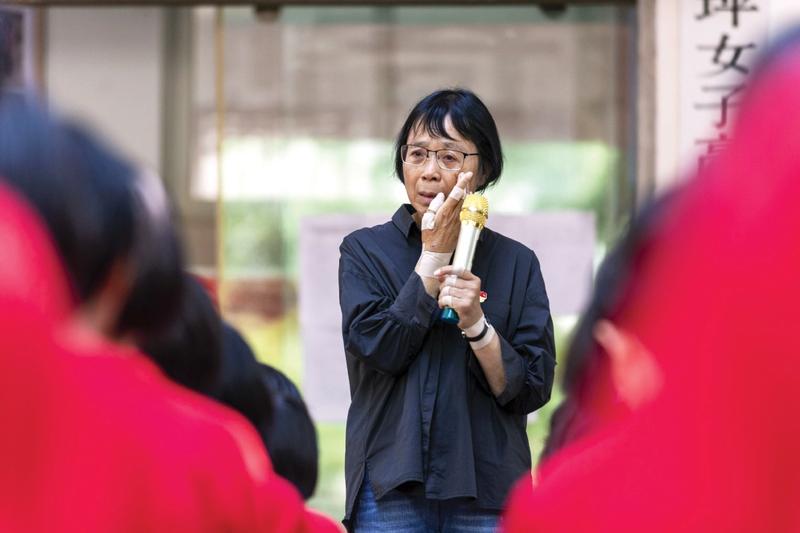 Zhang Guimei, founder and principal of Huaping High School for Girls in Huaping county in Southwest China’s Yunnan province, often has her aching fingers banded to ease pain. (PHOTO PROVIDED TO CHINA DAILY)
Zhang Guimei, founder and principal of Huaping High School for Girls in Huaping county in Southwest China’s Yunnan province, often has her aching fingers banded to ease pain. (PHOTO PROVIDED TO CHINA DAILY)
Seeing blood seeping through her torn trouser, Zhang Guimei sat disheartened and felt wronged.
It was 2005, and Zhang was at the gate of an enterprise in Kunming, capital of Yunnan province, soliciting donations to build a high school for girls in a rural county hundreds of miles away, when a dog dashed out and bit her hard.
The attack happened after Zhang, who was on vacation at that time, pleaded with a manager of the business enterprise for financial assistance for the school.
Refusing help, the business manager asked Zhang to leave and had a security guard chase her away, with an unleashed dog set upon her.
The experience was traumatic, but Zhang soon recovered from the incident, both physically and mentally, and renewed her work in earnest.
For years Zhang, a teacher of a middle school serving ethnic groups in Huaping county in Yunnan province, had dreamt of housing and schooling girls of poor families free of charge, to help the girls receive good education and move up in life. Her way of raising funds was walking the streets of the provincial capital and other cities during holidays seeking help.
At school she had noticed something weird. “Every now and then female students disappeared from my class,” she recounted years later to a program host of China Central Television.
The mystery was soon solved as she visited the families of the girls residing in the impoverished mountainous area.
“Some were called back home to do chores on the farms or work part time. Some parents received a betrothal gift, so they (had the) children drop out of school to get married,” Zhang recalled.
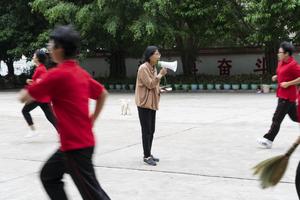 Zhang Guimei uses a bullhorn to urge her students to clean the playground of the Huaping High School for Girls in Lijiang, Yunnan province, on July 11. (CHEN XINBO / XINHUA)
Zhang Guimei uses a bullhorn to urge her students to clean the playground of the Huaping High School for Girls in Lijiang, Yunnan province, on July 11. (CHEN XINBO / XINHUA)
During one home visit, Zhang saw a girl sitting on top of a mountain, looking sadly into the distance, with a basket beside her. She learned that the girl was only thirteen or fourteen, but her parents asked her to drop out of school to get married for dowry money of 30,000 yuan (US$4,615).
Zhang wanted to take the girl away on the spot, but the girl’s mother threatened to take her own life if that happens, so the teacher had no choice but to give up.
She also found that poor families tended to think there is no point in sending girls for further education. “However, they treat their boys the opposite way, which drives me nuts,” Zhang said.
In another home she saw a middle-school boy doing extracurricular courses while his older sister, a senior student, was tearing corn cobs after abandoning her ambition of sitting for the national college entrance exam.
“At that moment, I realized how difficult it was for girls to receive an education and I came up with the idea of establishing a high school specifically for girls,” she said.
But her idea met with immediate skepticism. “What era are we in to have a school exclusive for girls?” said some. “Our county is poor, how to afford free schooling?” said others.
Undaunted, Zhang took to the street during spare time to collect donations. “Could you please spare five or two yuan? Or even 50 cents?” she would say, undeterred by negative responses or snide comments from passersby as she believed she was doing the right thing.
Some people whom she approached did not believe Zhang’s proclamations of collecting money for the school, accusing her of being “a cheat” or “a hoax”. So she learned to present her teacher’s certificate and awards she won in her career in a bid to convince such people.
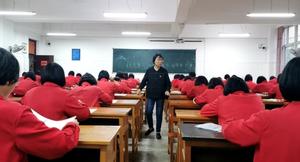 Zhang Guimei supervises an examination at the Huaping High School for Girls in Huaping county in Lijiang, Southwest China's Yunnan province. (PHOTO PROVIDED TO CHINA DAILY)
Zhang Guimei supervises an examination at the Huaping High School for Girls in Huaping county in Lijiang, Southwest China's Yunnan province. (PHOTO PROVIDED TO CHINA DAILY)
Born to a city family in northeast China, Zhang came to the southwestern Yunnan province in 1974 at 17 upon the country’s calls to support development in the border areas.
After college she followed her husband to teach in Dali city. Unfortunately her husband died of stomach cancer in 1994, leaving her childless.
“I was afraid of seeing things that would bring back memories of my husband, so in 1996 I applied for a transfer to teach in Huaping county,” Zhang said.
The county was one of the poorest in the province, and the school she chose was among the most difficult in terms of the teaching conditions. She defied all odds to carry on.
Yet the next year a serious illness reduced her to bed. Local teachers and leaders donated money for her treatment. “Huaping gave me a second life,” Zhang said, adding that it made her decide to “do something to pay back.”
She went on to earn local honors and in 2001, was appointed part-time president of a center for homeless children, only to find many of them abandonees of poor parents.
“I hope to break the vicious cycle that mothers of illiteracy raise children of illiteracy,” Zhang said. “Good education of one woman can influence three generations of individuals.”
By 2007, her efforts raised more than 20,000 yuan, a big amount for her but a small sum for a school.
In October that year, Zhang was attending the 17th National Congress of the Communist Party of China in Beijing, when a reporter noticed her jeans with holes, interviewed her and reported her story.
After that, governments of Lijiang city and Huaping county allocated one million yuan each to build the Huaping High School for Girls, which was officially opened in August 2008.
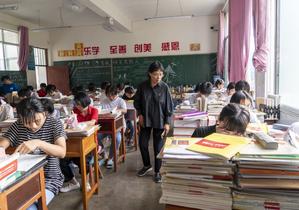 Zhang supervises students doing their homework on July 11. (CHEN XINBO / XINHUA)
Zhang supervises students doing their homework on July 11. (CHEN XINBO / XINHUA)
Funds for school operations and salaries of teaching staff are covered by the local government. At that time the whole nation was also embracing an enhanced “Spring Bud Project” that aimed to improve teaching conditions in impoverished regions and help girls who drop out of school to restart their education.
To Zhang’s great joy, 94 girls of poor families entered the school as the first group on Sept 1, 2008.
The new school had no dormitories, no canteen. At night the girls and women teachers rested in the classrooms while male teachers sheltered beneath staircases. Wind whirls blew dust across tables and all over the yard.
Moreover, as the school set no minimum admission score upon enrollment, some of the girls “couldn’t understand a math problem even after it was explained to them eight times,” Zhang noted.
Soon six girls dropped out. Half a year later, nine of the 17 teaching staff quit.
Whether the school could sustain became a big question, but Zhang discovered that five of remaining staff were Party members. So she gathered and encouraged them, drew a Party flag at the wall, and read the oath for joining the Party again. “All were in tears before the finish,” she recalled.
Zhang introduced strict discipline at the school and observed the rules herself. She slept and ate with her girls and supervised their studies, acting not only as the principal, but also as the security guard and caretaker, checking on the safety and well-being of the students as well as ensuring reliable infrastructure such as water and electricity.
To keep the girls at study, visiting the family of every student turned out to be the most important and difficult job for Zhang. The families were often in remote areas with no access to road. But, however hard, I was “determined to talk to the families of all students”, she said.
Once to reach a dropout student’s home on top of a hill, she tried the back of a motorbike of a township official, trekking on a half-meter trail at the side of a deep cliff. “I dared not move, for fear of any tilting on the motorbike could be disastrous,” Zhang recalled.
The student came to meet her halfway. “Why do you keep returning here?” Zhang questioned the student. The girl murmured: “Dear Teacher, where shall I be if not returning?” Such words only toughened Zhang’s resolve to improve the school.
At the home of a family from the Lisu ethnic group, a student’s grandfather said he would die in peace if his granddaughter managed to attend university. “I suddenly realized how important knowledge is to the elderly in the mountains, even though some families I had visited before prioritized boys over girls,” Zhang said.
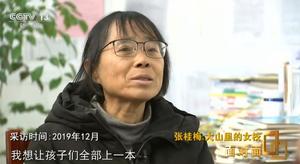 Zhang Guimei, founder and president of the Huaping High School for Girls in Huaping county in Lijiang, Southwest China's Yunnan province. (PHOTO PROVIDED TO CHINA DAILY)
Zhang Guimei, founder and president of the Huaping High School for Girls in Huaping county in Lijiang, Southwest China's Yunnan province. (PHOTO PROVIDED TO CHINA DAILY)
Over the years, the school principal travelled some 110,000 kilometers to visit more than 1,300 homes to promote the cause of girls’ education. She made the trips despite suffering a host of illnesses. During one such field trip, Zhang lost her way, broke her ribs, had high fever, and even fainted on the road.
To the surprise of many, in 2011, all the first batch of graduates from Zhang’s high school were admitted to universities or vocational colleges. By 2015, construction of all the school’s facilities was complete. By last year, about 1,800 girls from there had been enrolled in higher learning.
“My colleagues and I almost gave up our lives in order to do it,” Zhang said. She said one male teacher returned to school soon after his wedding, while a female teacher returned to the classroom after recovering from surgery to remove a tumor.
Six years ago, Zhang herself stopped teaching as she was battling more than a dozen diseases including a heart problem and emphysema, taking about 14 sorts of medicines every day. Now she has difficulty walking.
Throughout the years, she has been living in the student dormitory, spending most of her salary and the bonuses on her students.
In a congratulatory message delivered via video during the award of the fifth UNESCO Prize for Girls’ and Women’s Education in October 2020, Peng Liyuan, wife of Chinese President Xi Jinping, highlighted Zhang’s story.
“Fondly addressed as ‘Zhang Mama’ by the girls, Ms Zhang is like the beam of hope, lighting the way forward for the girls to pursue their life dreams,” Peng noted in her video message. Countless people in the country are dedicated to girls’ and women’s education, Peng said.
By 2020, the country saw 99.9 percent of school-age girls receiving formal education.
On Feb 25, at the Great Hall of the People in Beijing and in front of a nationwide audience, President Xi bowed as he bestowed a wheelchair-bound Zhang a national honorary title in recognition of her lifelong contribution.
Xu Weiwei in Hong Kong contributed to this story.


